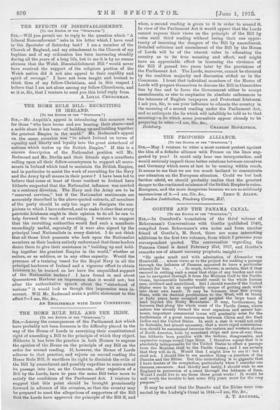THE HOME RULE BILL AND THE IRISH.
[TO TEE EDITOR OF 5115 "SPRCTATOR.".1
Sin,—Among the consequences of the Parliament Act which have probably not been foreseen is the difficulty placed in the way of the House of Lords in exercising their constitutional right of amending a Bill to the principle of which they object. Hitherto it has been the practice in both Houses to express the opinion of the House on the principle of any Bill on the order for second reading. If, however, the House of Lords adheres to that practice, and rejects on second reading the Home Rule Bill, it sacrifices its right to diminish the evils of the Bill by amendment and possibly expedites to some extent its passage into law, as the Commons, after rejection of a Bill by the Lords, have to pass the same Bill twice more to satisfy the conditions of the Parliament Act. I venture to suggest that this point should be brought prominently forward in advance of the occasion, so that the country may be prepared to meet the allegations of supporters of the Bill that the Lords have approved the principle of the Bill if, and when, a second reading is given to it in order to amend it. In view of the Parliament Act it would appear that the Lords cannot express their views on the principle of the Bill by votes until third reading without losing their one appal.. tunity of lessening the dangers of the Bill by amendment. Detailed criticism and amendment of the Bill by the House of Lords will be of the utmost value in educating the country as to its true meaning and effect, and might have an appreciable effect in lessening the virulence of the Bill if passed two years later by the provisions of the Parliament Act. The Lords, moreover, cannot be closured by the coalition majority and discussion stifled as in the Commons. I trust that individual members of the House of Lords will prepare themselves to discuss the Bill in Committee line by line and to force the Government either to accept amendments, or else to emphasize its absolute callousness to the interests of English taxpayers and Protestant Irishmen. I ask you, Sir, to use your influence to educate the country in the meaning of a second reading under the Parliament Act, and so anticipate the lie which will infallibly be told as to that meaning—a lie which some journalists appear already to be preparing to uttor.—I am, Sir, &e.,






































 Previous page
Previous page